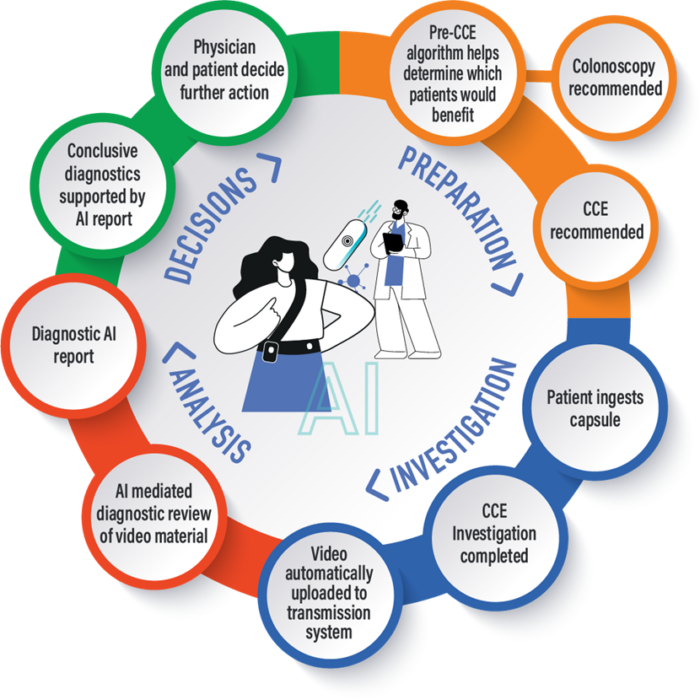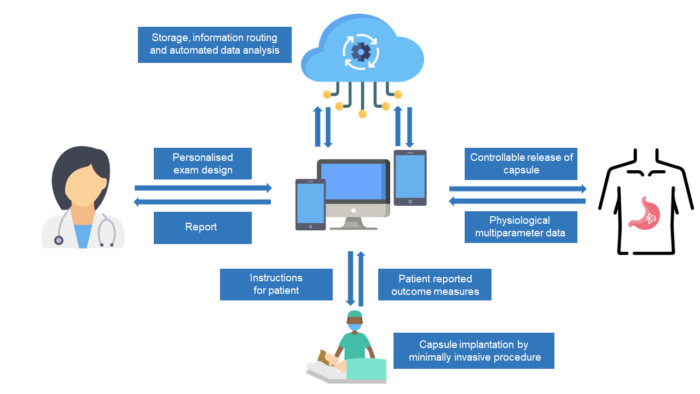World Digestive Health Day: Spotlighting EU’s Transformative Digital Health Projects, AICE and eCAP
[29 May 2024] Over 332 million people are estimated to be living with a digestive disorder in the European region, according to a report from United European Gastroenterology. In celebration of World Digestive Health Day, we are excited to showcase two transformative EU-funded projects redefining diagnostic processes in digestive health to address this high societal burden: AICE and eCAP. These projects, supported through Horizon Europe, are pioneering new technologies to improve patient care and enhance diagnostic accuracy.
AICE: Revolutionising Colorectal Cancer Screening and Diagnostics
Launched in 2022 with a €6 million budget, the AICE project is transforming colorectal cancer screening and diagnostics by integrating advanced AI algorithms into Capsule Camera Endoscopy (CCE). This technology enhances diagnostic accuracy and speed and offers a non-invasive alternative to traditional colonoscopy. The AICE consortium brings together a dynamic team of researchers and experts from 12 European organisations. Upon completion, this team will deliver high-quality diagnostics that enhance patient options and reduce healthcare costs, aiming to establish AI integration into CCE as routine practice.
AICE’s Progress and Future Plans
The AICE project has made significant progress in developing and validating AI algorithms using Danish data. As the project moves beyond its midpoint, efforts are underway to finalise access to Scottish data. An ethics advisory board is in place, focusing on the responsible use of AI in cancer screening and diagnostics. The next steps include refining the AICE Pathway, developing a companion app for patients, establishing clinical guidelines, and conducting cost-benefit analyses to ensure the project’s enduring impact and sustainability.

eCAP: Transforming GERD Diagnostics
With a €5 million budget, the eCAP project is transforming diagnostics for gastroesophageal reflux disease (GERD), aiming to overcome the limitations of traditional pH testing methods. The consortium, comprised of innovative European SMEs, research centres, and clinical sites, has developed an innovative solution for detecting reflux disease. It includes an implantable Bluetooth-enabled capsule, a smartphone-based e-health application, and a secure cloud-based data interpretation system. Attached during a diagnostic endoscopy, the capsule collects crucial data such as acid exposure, patient position, temperature, and bolus transport direction using sensors. This data, combined with real-time patient feedback through the smartphone app, enables the generation of comprehensive diagnostic reports, empowering clinicians with accurate insights to optimise patient care and treatment outcomes.
eCAP’s Progress and Future Plans
eCAP has completed its first benchtop and animal testing, validating the feasibility of its innovative system. The project is now gearing up for its first-in-human clinical trials, with further studies planned in Ukraine and Kenya to assess that the solution is universal and globally accessible.

Concluding Remarks on World Digestive Health Day
World Digestive Health Day is an essential platform for discussing the impact of technological advancements on gastrointestinal health. Projects like AICE and eCAP are at the forefront of digital health innovations improving global patient care.
For more detailed information and to keep up with the latest developments, please visit the websites of AICE and eCAP . You can also find AICE on LinkedIn and X and keep in touch with eCAP on LinkedIn and X.
About World Digestive Health Day
World Digestive Health Day, observed annually on May 29th, raises awareness about gastrointestinal diseases and promotes prevention, detection, and management through global educational initiatives.